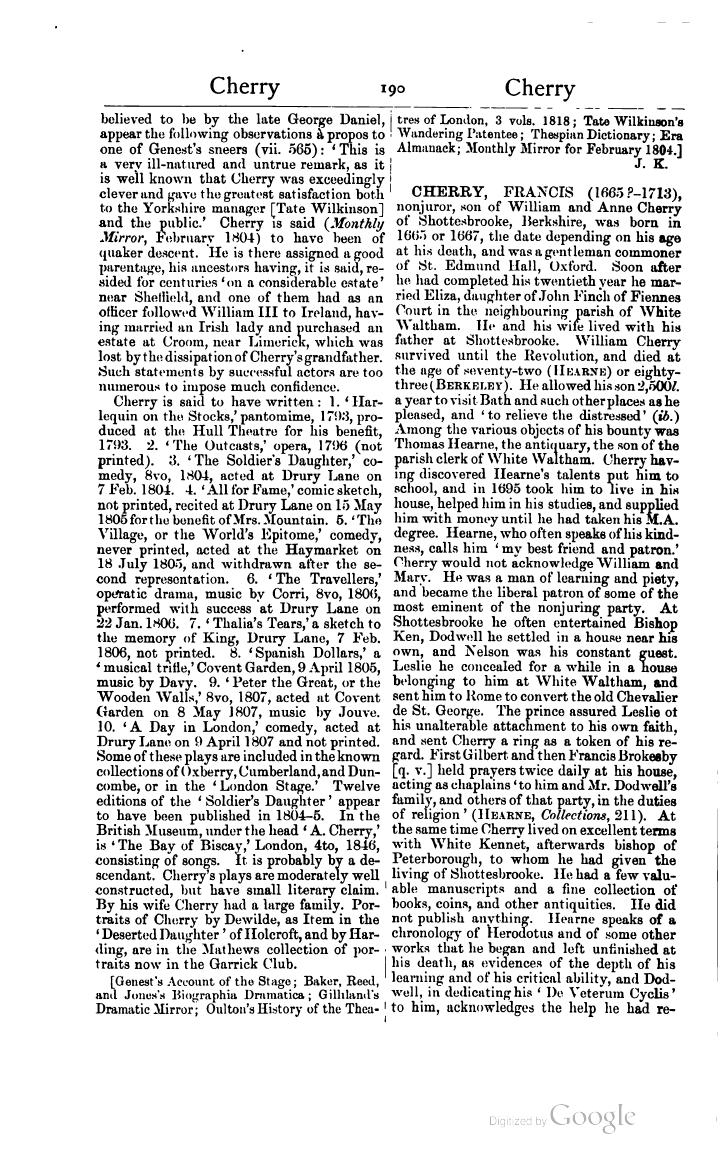believed to be by the late George Daniel, appear the following observations à propos to one of Genest's sneers (vii. 565): ‘This is a very ill-natured and untrue remark. as it is well known that Cherry was exceedingly clever and gave the greatest satisfaction both to the Yorkshire manager [Tate Wilkinson] and the public.’ Cherry is said (Monthly Mirror, February 1804) to have been of quaker descent. He is there assigned a good parentage, his ancestors having, it is said, resided for centuries ‘on a considerable estate’ near Sheffield, and one of them had as an officer followed William III to Ireland, having married an Irish lady and purchased an estate at Croom, near Limerick, which was lost by the dissipation of Cherry's grandfather. Such statements by successful actors are too numerous to impose much confidence.
Cherry is said to have written:
- ‘Harlequin on the Stocks,’ pantomime, 1793, produced at the Hull Theatre for his benefit. 1793.
- ‘The Outcasts,’ opera, 1796 (not printed).
- ‘The Soldier's Daughter,’ comedy, 8vo, 1804, acted at Drury Lane on 7 Feb. 1804.
- ‘All for Fame,’ comic sketch, not printed, recited at Drury Lane on 15 May 1805 for the benefit of Mrs. Mountain.
- ‘The Village, or the World's Epitome,’ comedy, never printed, acted at the Haymarket on 18 July 1805, and withdrawn after the second representation.
- ‘The Travellers,’ operatic drama, music by Corri, 8vo, 1806, performed with success at Drury Lane on 22 Jan. 1806.
- ‘Thalia’s Tears,’ a sketch to the memory of King, Drury Lane, 7 Feb. 1806, not printed.
- ‘Spanish Dollars,’ a ‘musical trifle,’ Covent Garden, 9 April 1805, music by Davy.
- ‘Peter the Great, or the Wooden Walls,’ 8vo, 1807, acted at Covent Garden on 8 May 1807, music by Jouve.
- ‘A Day in London,’ comedy, acted at Drury Lane on 9 April 1807 and not printed.
Some of these plays are included in the known collections of Oxberry, Cumberland, and Duncombe, or in the ‘London Stage.’ Twelve editions of the ‘Soldier’s Daughter’ appear to have been published in 1804–5. In the British Museum, under the head ‘A. Cherry,’ is ‘The Bay of Biscay,’ London, 4to, 1846, consisting of songs. It is probably by a descendant. Cherry's plays are moderately well constructed, but have small literary claim. By his wife Cherry had a large family. Portraits of Cherry by Dewilde, as Item in the ‘Deserted Daughter’ of Holcroft, and by Harding, are in the Mathews collection of portraits now in the Garrick Club.
[Genest's Account of the Stage; Baker, Reed, and Jones's Biographia Dramatica; Gilliland's Dramatic Mirror; Oulton's History of the Theatres of London, 3 vols. 1818; Tate Wilkinson's Wandering Patentee; Thespian Dictionary; Era Almanack; Monthly Mirror for February 1854.]
CHERRY, FRANCIS (1665?–1713), nonjuror, son of William and Anne Cherry of Shottesbrooke, Berkshire, was born in 1665 or 1667, the date depending on his age at his death, and was a gentleman commoner of St. Edmund Hall, Oxford. Soon after he had completed his twentieth year he married Eliza, daughter of John Finch of Fiennes Court in the neighbouring parish of White Waltham. He and his wife lived with his father at Shottesbrooke. William Cherry survived until the Revolution, and died at the age of seventy-two (Hearne) or eighty-three (Berkeley). He allowed his son 2,500l. a year to visit Bath and such other places as he pleased, and ‘to relieve the distressed’ (ib.) Among the various objects of his bounty was Thomas Hearne, the antiquary, the son of the parish clerk of White Waltham. Cherry having discovered Hearne's talents put him to school, and in 1695 took him to live in his house. helped him in his studies, and supplied him with money until he had taken his M.A. degree. Hearne, who often speaks of his kindness, calls him ‘my best friend and patron.' Cherry would not acknowledge William and Mary. He was a man of learning and piety, and became the liberal patron of some of the most eminent of the nonjuring party. At Shottesbrooke he often entertained Bishop Ken, Dodwell he settled in a house near his own. and Nelson was his constant guest. Leslie he concealed for a while in a house belonging to him at White Waltham, and sent him to Rome to convert the old Chevalier de St. George. The prince assured Leslie of his unalterable attachment to his own faith, and sent Cherry a ring as a token of his regard. First. Gilbert and then Francis Brokesby [q. v.] held prayers twice daily at his house, acting as chaplains ‘to him and Mr. Dodwell’s family, and others of that party, in the duties of religion' (Hearne, Collections, 211). At the same time Cherry lived on excellent terms with White Kennet, afterwards bishop of Peterborough, to whom he had given the living of Shotteshrooke. He had a few valuable manuscripts and a fine collection of books, coins, and other antiquities. He did not publish anything. Hearne speaks of a chronology of Herodotus and of some other works that he began and left unfinished at his death, as evidences of the depth of his learning and of his critical ability, and Dodwell, in dedicating his ‘De Veterum Cyclis’ to him, acknowledges the help he had re-
